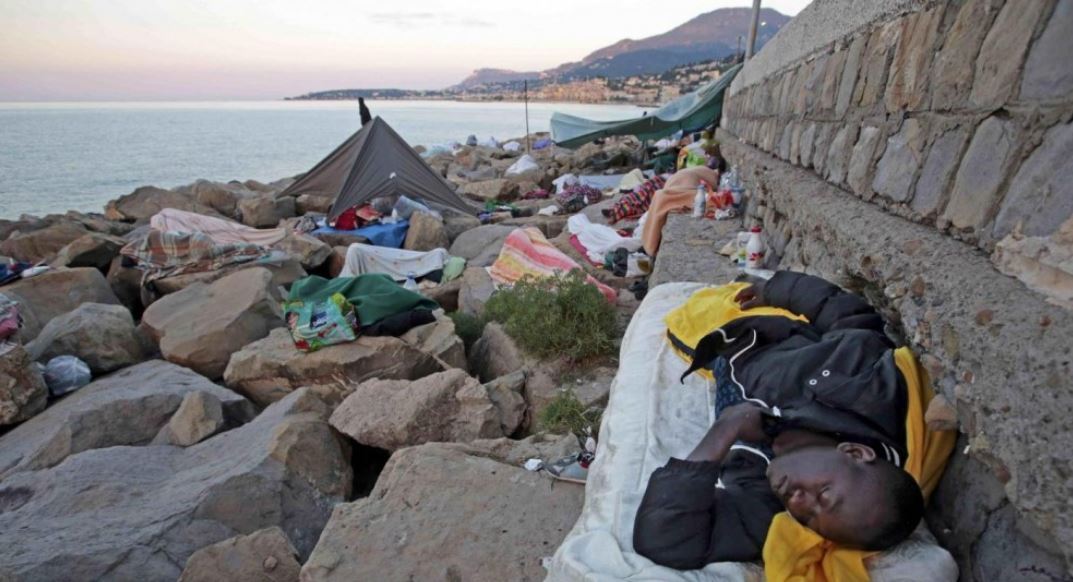Sickboy007
Member

Since Thursday June 11th, about 200 immigrants have been trying to cross the border between France and Italy, near the small town of Ventimiglia in Italy, but the French police have been preventing their entrance into the country. For the Italian Minister of the Interior, Angelino Alfano, this incident in Ventimiglia is "a slap in the face" from Europe. This weekend tensions increased between France and Italy concerning the issue of sharing responsibility for the increase in immigrants. The two countries are opposed in their visions of "European solidarity," which Ventimiglia has abruptly brought into stark relief.
On Sunday morning, as the migrants continued to protest peacefully with signs that read "We need to pass" or, "We need freedom," a dozen far-right activists from the small political group "Génération Identitaire" unfurled a red banner with the words "No way. You will not make Europe home." The Italian police swiftly put a stop to the group's actions, which had already been publicized at the end of May when they unfurled a similar banner in Paris.
The Alpes Maritimes prefect, Adolphe Colrat, declared on Friday that during the preceding week, 1,439 illegal immigrants had been arrested by law enforcement authorities in the southeast department of France. Just over 1000 were brought back to Italy. This weekend, in Ventimiglia, the French police prevented further immigrants, particularly from Somalia, Côte d'Ivoire, and Sudan, from entering France.
The European Union's Dublin Regulation requires immigrants to make their applications for asylum in their first country of entry. The regulation means Italy, which saw 171,000 immigrants arrive in 2014, or Greece, will receive the overwhelming majority of applications for asylum. The Italian Prime Minister considers it unfair that his country should have to shoulder the burden of the immigrants alone, and would prefer that Italy be primarily an entrance for most immigrants to reach other countries such as the United Kingdom, Germany, or even Sweden.
According to Italian Prime Minister Matteo Renzi, the Dublin Convention should be "modified," but Bernard Cazeneuve, the French Minister of the Interior, does not share the same sentiments. Cazeneuve said on Monday morning on BFM TV that "It is necessary to respect the Dublin rules." She proposed, however, opening "hotspots" in Italy centers where illegal immigrants or asylum-seekers could be differentiated from one another. With the population organized accordingly, Cazeneuve claims to be interested in distributing immigrants among the member states of the EU, "because we certainly favor doing so, in terms of solidarity."
Critics say this is just Cazeneuve's way of saying she is in favor of distribution, as long as she knows that it's only of legal immigrants.
A preliminary meeting is scheduled for this Tuesday, ahead of a summit of European leaders on June 25, to discuss distributing immigrants eligible for refugee status. Around 24,000 immigrants would be affected by this distribution, a number so low that Matteo Renzi considers it "almost a provocation," because his country will welcome about 200,000 immigrants in 2015. The Italian minister of the interior, Angelino Alfano, spoke on Sky TG24 this Sunday and warned the European community: "We will not accept a selfish Europe."
https://news.vice.com/article/france-and-italy-cant-seem-to-agree-on-what-to-do-about-the-immigration-crisis
Since the start of this year, more than 100,000 refugees from North Africa and the Middle East have crossed the Mediterranean, fleeing persecution or simply seeking a better life in Europe. While this huge influx represents an unprecedented challenge for the EU, the immediate burden has fallen disproportionately on the blocs southern states: Greece, Spain and particularly Italy. They have been left picking up the social and economic costs of resettling the migrants, a demanding task at a time of austerity.
It is a situation that Matteo Renzi is not willing to suffer in silence. This week, Italys prime minister warned that if EU leaders do not agree a quota system to spread the burden of resettlement more equitably, his government will issue arriving migrants with three-month visas to travel across the blocs passport-free Schengen zone. This will in effect dismantle the EUs Dublin Convention, a longstanding legal mechanism by which the responsibility for migrants falls on the country at which they enter the union.
Mr Renzis concerns need to be heeded. The European Commission has identified some 40,000 migrants as genuine asylum seekers who should be resettled across the bloc. At an EU summit next week, member states should volunteer to share out this comparatively small number among themselves. Even the UK, which has an opt-out, should not balk at taking its fair share. It led the military action to topple the Gaddafi regime, subsequently destabilising Libya, now the transit country for many refugees. The UK bears moral and humanitarian responsibility for helping to resolve the crisis.
However, political realities mean the EU cannot simply commit to resettle ever more migrants. It needs to balance generosity of spirit with actions that deter such population movements, recognising that there is a limit to how many people Europe can admit.
The EU needs to set up centres in Italy, Greece and Spain to identify the minority of refugees who qualify for asylum. The bloc must then start returning economic migrants to their home states. As a further deterrent, the EU should take action against those who are driving the trafficking trade. Those responsible should be arrested and their boats seized and destroyed.
Nor should the EU focus simply on the points of entry. It needs to look outwards to the countries at the source of the migrant flows. In Libya, a failed state, that means doing far more to encourage the long and difficult task of political and economic reconstruction. The EU should also ask Middle Eastern countries, especially the Gulf states, to take in some of those displaced by conflict.
http://www.ft.com/cms/s/0/22e0e7a8-14df-11e5-a51f-00144feabdc0.html#axzz3dQzGjIKq
